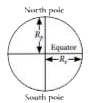If the radius of the Earth shrinks by 2%, mass remaing same, then how would the have of acceleration due to gravity change?
Video Solution
Text Solution
g=Gm2R2
Taking logarithm logg=logG+2logm−2logR
Differenntiating it dgg=0+0−2dRR=−2[−2100]
dgg×100=−2[−2100]×100=4%.
|
Topper's Solved these Questions
- GRAVITATIONBOOK - CBSE COMPLEMENTARY MATERIALCHAPTER - GRAVITATIONEXERCISE - MULTIPLE CHOICE QUESTIONS
19 Videos
- GRAVITATIONBOOK - CBSE COMPLEMENTARY MATERIALCHAPTER - GRAVITATIONEXERCISE - LONG ANSWER TYPE QUESTIONS (5 MARKS)
6 Videos
- DIMENSIONS AND MEASUREMENT BOOK - CBSE COMPLEMENTARY MATERIALCHAPTER - DIMENSIONS AND MEASUREMENT EXERCISE - M.C.Q PHYSICAL WORLD & MEASUREMENT
20 Videos
- KINEMATICSBOOK - CBSE COMPLEMENTARY MATERIALCHAPTER - KINEMATICSEXERCISE - M.C.Q.
20 Videos
Similar Questions
Knowledge Check
If the radius of the earth shrinks by 1.5% ( mass remaining same) , then the value of acceleration due to gravity changes by
A0.01B0.03C0.04D0.02If the radius of the earth shrinks by 1.5% ( mass remaining same) , then the value of acceleration due to gravity changes by
A1%B2%C3%D4%The Earth is not a perfect sphere. Due to the flattening of Earth at the poles, the radius of Earth is minimum at the poles and hence the value of g is maximum at the poles. One the other hand, the radius of the Earth is maximum at the equator of the Earth. As the mass and radius of moon are smaller than that of the Earth, so the value of g on moon is 1.63m/s2 . As we go up from the surface of the Earth, the distance from the centre of the Earth increases and hence the value of g decreases. The value of g decreases as we go down inside the Earth and it become zero at the centre of the Earth .

If the radius of the Earth were to shrink by 1% and its mass remaining the same, the acceleration due to gravity on the Earth's surface wouldAdecreasesBincreasesCremain unchangedDwill decrease by 9.8%
If the radius of the earth where to shrink by 1% with its mass remaining the same, the acceleration due to gravity on the earth's surface would :
View SolutionIf the radius of the earth where to shrink by 1% with its mass remaining the same, the acceleration due to gravity on the earth's surface would :
View SolutionIf the radius of the earth were to shrink by 1% its mass remaining the same, the acceleration due to gravity on the earth's surface would
View SolutionIf the radius of the Earth shrinks by 2%, mass remaing same, then how would the have of acceleration due to gravity change?
View SolutionIf the radius of the earth were to shrink by one percent its mass remaining the same, the acceleration due to greavity on the earth's surface would
View Solution
